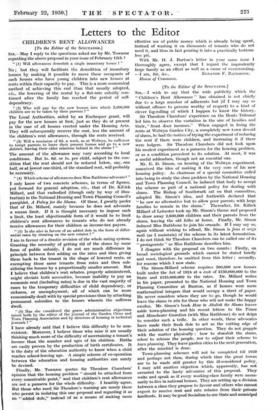Letters to the Editor
CHILDREN'S RENT ALLOWANCES [To the Editor of the SPECTATOR.]
SIE,—May I reply to the questions asked me by Mr. Townroe regarding the above proposal in your issue of February 15th ?
" (1) Will allowances demolish a single insanitary house ? "
No ; but they will facilitate the demolition of insanitary houses by making it possible to move these occupants of such houses who have young children into new houses at rents within, their, capacity to pay. This is a more economical method of achieving this end than that usually adopted, viz., the lowering of the rental by a flat-rate subsidy con- tinued after the family has reached the period of self- dependency.
" (2) Who will pay for the new houses into which 2,000,000 children are to be taken by their parents ? "
The Local Authorities, aided by an Exchequer grant, will pay for the new houses at first, just as they do at present in the case of all houses erected under the Housing Acts. They will subsequently recover the cost, less the amount of the children's rent allowances, through the rents received.
" (3) Will a remission of 6d. a week, as at Welwyn, be sufficient to tempt parents to leave their present homes and go to a new district, leaving their older relations behind in the slums ? "
The amount of the allowance may vary according to local conditions. But ls. 6d. or is. per child, subject to the con- dition that the rent should not be reduced below, say, one half, or atiinvest one-third, of the standard rent, will probably be necessary.
" (4) Which scheme of allowances does Miss Rathbone advocate? " I only know of two concrete schemes, in terms of figures, put forward for general adoption, viz., that of Dr. Kiliick Millard, and that embodied (though only by way of illus- tration) in the National „Housing and Town Planning Council's pamphlet, A Policy for the Slums. Of these, I greatly prefer that of Dr. Millard, mainly because he does not advocate a means limit. If it is thought necessary to impose such a limit, the least objectionable form of it would be to limit children's rent allowances to tenants who do not already receive allowances for their children as income-tax payers.
" (5) Is she also in favour of an added dole in the form of differ. ential rates by iterating on the new estates ? "
I am in favour of a drastic revision of the whole rating system. Granting the necessity of getting rid of the slums by some form of public subsidy, I do not see much difference in principle between first adding on the rates and then giving them back to the tenant in the shape of lowered rents, or exempting those same tenants from rates and then sub- sidizing the houses by a proportionally smaller amount. But I believe that children's rent rebates, properly administered, might- obviate both necessities, because iimbility to pay an economic rent (including rates) is due in the vast majority of cases to the temporary difficulties of child dependency, or sickness, or unemployment, all of which can be more economically dealt with by special provisions than by attaching permanent subsidies to the houses wherein the sufferers dwell.
" (6) Has she considered the grave .administrative objections raised both by the editor of the journal of the Garden Cities and Town Planning Association and by directors of housing in technical journals ? "
I have already said that I believe this difficulty to be non- existent. Moreover, I believe those who raise it are usually thinking much more of the difficulty of ascertaining a tenant's income than the number and ages of his children. Births are easily proven by the production of birth certificates. It is the duty of the education authority to know when a child reaches school-leaving age. A simple scheme of co-operation between the education and housing authorities can surely be devised.
Finally, Mr. Townroe quotes Sir Theodore Chambers' opinion that the housing problem " should be attacked from every conceivable point," and that children's rent allowances are not a panacea for the whole difficulty. I heartily agree. But those who need Sir Theodore's warning are surely those who persist in isolating this'ne proposal and regarding it as an " added dole," instead of as a means -of making more effective use of public money which is already being spent, instead of wasting it on thousands of tenants who do not need it, and thus in fact pouring it into a practically bottom- less pit.
With Mr. H. J. Barton's letter in your same issue I thoroughly agree, except that I regard the imprudently large family as an effect as well as a cause of overcrowding.










































 Previous page
Previous page